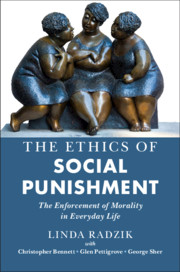The Ethics of Social Punishment
The Enforcement of Morality in Everyday Life
- Authors:
- Linda Radzik, Texas A & M University
- Christopher Bennett, University of Sheffield
- Glen Pettigrove, University of Glasgow
- George Sher, Rice University, Houston
- Date Published: November 2020
- availability: Not yet published - available from October 2024
- format: Paperback
- isbn: 9781108799294
Paperback
Other available formats:
Hardback, eBook
Looking for an inspection copy?
This title is not currently available for inspection. However, if you are interested in the title for your course we can consider offering an inspection copy. To register your interest please contact [email protected] providing details of the course you are teaching.
-
How do we punish others socially, and should we do so? In her 2018 Descartes Lectures for Tilburg University, Linda Radzik explores the informal methods ordinary people use to enforce moral norms, such as telling people off, boycotting businesses, and publicly shaming wrongdoers on social media. Over three lectures, Radzik develops an account of what social punishment is, why it is sometimes permissible, and when it must be withheld. She argues that the proper aim of social punishment is to put moral pressure on wrongdoers to make amends. Yet the permissibility of applying such pressure turns on the tension between individual desert and social good, as well as the possession of an authority to punish. Responses from Christopher Bennett, George Sher and Glen Pettigrove challenge Radzik's account of social punishment while also offering alternative perspectives on the possible meanings of our responses to wrongdoing. Radzik replies in the closing essay.
Read more- Examines the overlooked moral phenomenon of social punishment in everyday life
- Develops a distinctive account of desert that can be applied to topics beyond social punishment, including legal punishment
- Extends the existing philosophy of punishment to contemporary phenomena such as 'call-out culture' and public shaming on social media
Reviews & endorsements
'The Ethics of Social Punishment uses the philosophy of punishment to bring some conceptual clarity to aspects of social life that have long gone unnoticed by moral philosophers. It shows us how we make use of the power to punish in everyday life, and tries to determine when we are justified in doing so. This book will be instructive for both moral and political philosophers as well as for any social scientists interested in the conceptual basis of informal social control.' Jacob Abolafia, Tel Aviv University
See more reviews'Linda Radzik's new book is truly excellent. It is resolute, inviting, very well written, and extremely timely.' Leo Zaibert, Criminal Law and Philosophy
Customer reviews
Not yet reviewed
Be the first to review
Review was not posted due to profanity
×Product details
- Date Published: November 2020
- format: Paperback
- isbn: 9781108799294
- length: 200 pages
- dimensions: 230 x 153 x 10 mm
- weight: 0.4kg
- availability: Not yet published - available from October 2024
Table of Contents
Preface
Part I. The Descartes Lectures 2018:
1. Defining social punishment
2. Justifying social punishment
3. Practicing social punishment
Part II. Commentaries:
4. How to do things with blame (and social punishment) Christopher Bennett
5. On social punishment George Sher
6. Punishment and protest Glen Pettigrove
Part III. Replies:
7. Replies to Bennett, Sher and Pettigrove Linda Radzik
Bibliography
Index.
Sorry, this resource is locked
Please register or sign in to request access. If you are having problems accessing these resources please email [email protected]
Register Sign in» Proceed
You are now leaving the Cambridge University Press website. Your eBook purchase and download will be completed by our partner www.ebooks.com. Please see the permission section of the www.ebooks.com catalogue page for details of the print & copy limits on our eBooks.
Continue ×Are you sure you want to delete your account?
This cannot be undone.
Thank you for your feedback which will help us improve our service.
If you requested a response, we will make sure to get back to you shortly.
×









